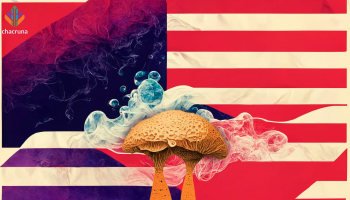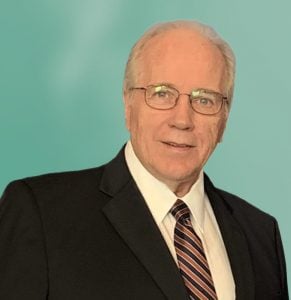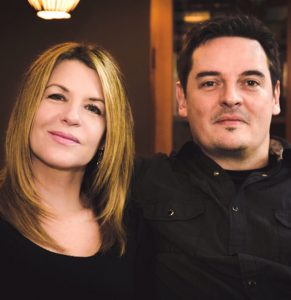Disclaimer: Psychedelics are largely illegal substances, and we do not encourage or condone their use where it is against the law. However, we accept that illegal drug use occurs and believe that offering responsible harm reduction information is imperative to keeping people safe. For that reason, this article is designed to enhance the safety of those who decide to work with psychedelics.
Psychedelic bans enshrined into law since the 1960s no longer hold the same weight today. In fact, proponents across the political spectrum are deliberately parsing entheogens from the drug war by recognizing the substances’ significant healing potential. Local, state, and federal officials from the US to Canada are proposing diverse acceptance models, covering decriminalization, legalization, and medical programs. While we wish responsible reforms were more consistent and sweeping, it’s clear that the story of psychedelic freedom will unfold in multiple micro-chapters. This month’s chapter examines Oregon, San Francisco, the White House, and Canada’s legal system. Let’s review the top psychedelics news stories for August 2022.
One in Four Americans Have Tried Psychedelics
Advocating for mainstream psychedelics acceptance can feel like an uphill battle against the uninformed dominant class. It can feel like no one outside the community understands their transformative power. And yet surveys like the latest YouGovAmerica poll prove that the psychedelic community is much larger than opponents would like to admit. The poll showed that at least 28% of Americans had tried one or more of the seven psychedelic drugs. The most popular substances were LSD (14%) and psilocybin (13%), followed by MDMA (9%), mescaline (8%), ketamine (6%), DMT (6%), and salvia (5%). From a demographic perspective, liberals and college-educated 30-44 year-olds were most likely to have tried psychedelics, while black Americans, those in rural areas, the elderly, and conservatives were least likely. Overall, these findings signify great news. At the same time, socio-economic figures show the psychedelics community has more work to do to grant equitable access to all Americans.
Eight Canadians Sue the Government for Psilocybin Access
The Canadian government grants psilocybin therapy to qualifying end-of-life patients, but they don’t make it easy. That’s why eight Canadians filed suit against the Government of Canada and the Minister of Health this month. Seven patients and one health care practitioner argue that the nation’s medical model is too prohibitive and violates Section 7 of the Canadian Charter of Rights and Freedoms, which guarantees the right to life, liberty, and security. TheraPsil, a non-profit coalition fighting for Canadian psilocybin therapy access, agrees. TheraPsil is paying all court fees through fundraising in hopes that this will be the landmark case that legalizes psychedelics for all Canadians. “For two years, we’ve done absolutely everything in our power to play nicely with the government. If we get this [win], nobody in Canada will ever have to go to court again for access to psilocybin. No more people will be dying waiting for access. This is what we’ve been working towards,” said TheraPsil’s CEO Spencer Hawkswell. in the National Post.
Grow 1 Year's Worth of Microdoses in Just 6 Weeks
Third Wave partnered with top mycologists to create the world’s easiest and best mushroom growing program (kit, course, and expert support).
- Pre-sterilized and sealed
(ready to use out of the box) - Step-by-step video and text course
- Access to growing expert in community
- Make your first harvest in 4-6 weeks
- Average yield is 1 - 4 ounces (28-108g)
- Fits in a drawer or closet
- Enter info for Third Wave discounts:
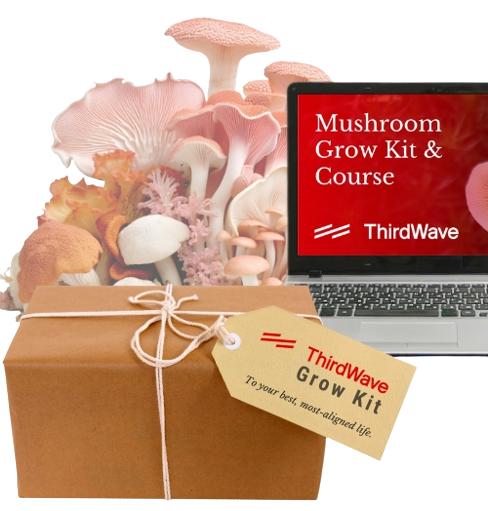
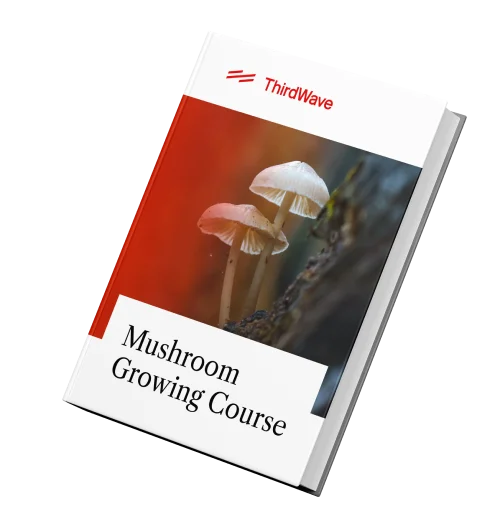
Grow 1 Year's Worth of Microdoses in Just 6 Weeks
Third Wave partnered with top mycologists to create the world’s easiest and best mushroom growing program (kit, course, and expert support).
- Pre-sterilized and sealed
(ready to use out of the box) - Step-by-step video and text course
- Access to experts in community
- Make your first harvest in 4-6 weeks
- Average yield is 1 - 4 ounces (28-108g)
- Fits in a drawer or closet
- Enter info for Third Wave discounts
Ann Shulgin, MDMA Trailblazer, Dies at 91
Psychologist and psychedelics pioneer, Ann Shulgin, died at 91 years-old last month. Before 1960s prohibition and decades before MDMA’s 2017 ‘breakthrough therapy designation,’ Ann and her chemist husband, Alexander (Sasha), researched and experimented with various psychedelics in their home laboratory. As a result, Ann staunchly advocated for MDMA as a tool for PTSD treatment, self-discovery, and strengthening relationships. Ann and Sashi continued leading the movement even after the government banned MDMA in 1985. Together they published the book PiHKAL: A Chemical Love Story with information on dosages and how to make 179 different psychoactive substances. Until her death, Ann continued making a mark in the community. Featured in Michael Pollan’s recent How to Change Your Mind docuseries, Ann issued her final message on why MDMA is so impactful–“…[MDMA] allows you to see who you are without a self-rejection. That’s what it’s for, for insight….”
Biden Administration Braces for Legal Psychedelic Therapies
In 2017 and 2019, respectively, the FDA deemed MDMA and psilocybin ‘Breakthrough Therapies.” And in the five years since, research has exploded. For instance, MAPS’ Phase 3 MDMA-Assisted Psychotherapy Study for PTSD is expected to deliver positive results in the coming year. In parallel, recent psilocybin therapy clinical trials show the substance can safely reduce symptoms of treatment-resistant depression. The evidence speaks for itself, forcing the federal government to reconsider its antiquated stance. A letter (obtained by The Intercept) by President Biden’s Assistant Secretary for Mental Health and Substance Use, Miriam Delphin-Rittmon, shows the administration expects the FDA to approve both substances in the next two years. To prepare, they’re considering establishing a federal task force to monitor” the emerging psychedelic treatment ecosystem.” In the letter, Delphin-Rittmon also indicated that the Substance Abuse and Mental Health Services Administration, or SAMHSA “agrees that too many Americans are suffering from mental health and substance use issues…. and that we must explore the potential of psychedelic-assisted therapies to address this crisis.” This letter marks a landmark shift from Nixon and Reagan-era drug-war rhetoric toward a more open and accepting federal government.
Grow 1 Year's Worth of Microdoses in Just 6 Weeks
Third Wave partnered with top mycologists to create the world’s easiest and best mushroom growing program (kit, course, and expert support).
- Pre-sterilized and sealed
(ready to use out of the box) - Step-by-step video and text course
- Access to growing expert in community
- Make your first harvest in 4-6 weeks
- Average yield is 1 - 4 ounces (28-108g)
- Fits in a drawer or closet
- Enter info for Third Wave discounts:


Grow 1 Year's Worth of Microdoses in Just 6 Weeks
Third Wave partnered with top mycologists to create the world’s easiest and best mushroom growing program (kit, course, and expert support).
- Pre-sterilized and sealed
(ready to use out of the box) - Step-by-step video and text course
- Access to experts in community
- Make your first harvest in 4-6 weeks
- Average yield is 1 - 4 ounces (28-108g)
- Fits in a drawer or closet
- Enter info for Third Wave discounts
San Francisco Considers Ending Psychedelics Prosecutions
San Francisco is the latest California city to address unfair psychedelics prosecutions. In late July, city officials presented a new measure to reduce non-violent drug offenses. The bill didn’t go so far as decriminalizing entheogenic substances but may make it easier for people to journey responsibly and for practitioners to perform psychedelic therapy without fear of retribution. The measure states: “City resources not be used for any investigation, detention, arrest, or prosecution” related to the use of “Entheogenic Plants listed on the Federally Controlled Substances Schedule 1 list.” The state senate will vote on the measure sometime after returning from recess on September 1st. In the meantime, city residents and psychedelic advocates can reach out to local officials to show their support. If the measure passes, San Francisco will join three other California cities–Oakland, Arcata, and Santa Cruz–that hold similar legislation.
Oregonians Will Vote on Psilocybin Bans in November
In November 2020, Oregonians voted for Measure 109, aka the Psilocybin Services Act (PSA), establishing a framework for adults (21 and older) to purchase, possess, and consume psilocybin at designated centers. In May 2022, state legislatures issued rules surrounding magic mushroom sales, testing, and facilitator training. Many expect supervised psilocybin facilities to open by the end of 2023–but not every city will partake. When Oregonians passed the PSA in 2020, the law included a provision for cities and counties to back out of the program through local votes. So, in November 2022, Oregonian voters in 26 counties and 57 cities will determine whether to ban or postpone psilocybin centers in their areas. They’ll also vote on whether to allow psilocybin production. Regardless of the outcome, at least 27 cities indicated that they would enable psilocybin treatment access, representing nearly half of Oregon’s population.
Mystical Experiences Linked to Pro-Environmental Behaviors
According to a recent Journal of Humanistic Psychology study, people who have had “mystical experiences” are more likely to act in ways that support environmental conservation. The study defined mystical experiences as profound and pivotal events that significantly influence one’s life. Expanding on similar 2017 research, the authors surveyed 240 participants with prior psychedelic backgrounds and asked about their mystical states, personality, and pro-environmental behavior (PEB). According to the survey, PEB refers to acting in ways that seek to minimize harmful environmental impact and support sustainability. Unsurprisingly, the survey found that people who met the criteria for complete mystical states were far more likely to report behaviors like eco-shopping and eating” and “one-off domestic conservation actions” than those who did not. Studies like this highlight that people’s sense of oneness following psychedelic journeys can translate into real-world actions that support a sustainable future for everyone.
August marked another memorable month toward progressing the psychedelic mission. We look forward to continuously updating you with the latest, high-quality news surrounding plant medicines, clinical developments, education, and more. Did you enjoy this article? Let us know! See something missing? We’ll consider adding it. Contact us today.



